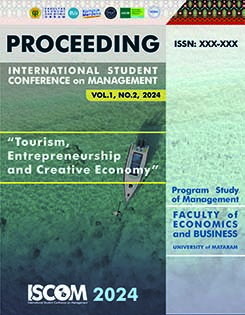THE ROLE OF ISLAMIC FINANCIAL INSTRUMENTS IN INDONESIA’S ECONOMIC GRO WTH
Keywords:
GDP, Bond, Sukuk, Syariah Banking Financng, Syariah Banking AssetsAbstract
Introduction
: This research highlights the role of Islamic financial i
nstruments, such as sukuk and Islamic banking, in driving economic growth in I
ndonesia. This study aims to analyze the positive impact of these instruments
on Indonesia's economy, particularly in terms of GDP, investment, and financi
al stability. The title is interesting due to its relevance in the context of
an economy with a Muslim majority, as well as its potential to offer alternat
ive financing options in accordance with Islamic principles that can advance t
he Islamic financial market.
Research Methods
: The data used in this study is secondary data in the fo
rm of a time series. This data was obtained from the official websites of Ban
k Indonesia (BI) and the Financial Services Authority (OJK) for the period fr
om January 2018 to December 2023. In this study, the data was processed using
Eviews 9 with the Auto Regressive Distributed Lag (ARDL) approach.
Finding/Results
: The research results show that in the short term, both t
otal financing and total Islamic banking assets have a significant impact on e
conomic growth, with probability values of 0.036 and 0.077 at the 5% and 10%
significance levels, respectively. This indicates that an increase in these t
wo variables tends to be accompanied by an increase in economic growth over a
short period. On the other hand, the variables sukuk and bonds do not show a
significant impact on economic growth, either in the short or long term.
References
Alvionita, M. (2021). PENGARUH PENERBITAN OBLIGASI DAN SUKUK TERHADAP PERTUMBUHAN EKONOMI INDONESIA. Jurnal Ilmiah Mahasiswa FEB Universitas Brawijaya, 9(2). https://jimfeb.ub.ac.id/index.php/jimfeb/article/view/7501
Amalia, F., Sinaga, R., Asyari, & Soeyatno, R. (2022). EKONOMI PEMBANGUNAN. Widina Bhakti Persada.
Ariani, R. S., Parno, & Pratiwi, A. (2022). PENGARUH DANA PIHAK KETIGA (DPK), FINANCING TO DEPOSIT RATIO (FDR), NON PERFORMING FINANCING (NPF) DAN RETURN ON ASSET (ROA) TERHADAP TOTAL ASET PERBANKAN SYARIAH DI INDONESIA. Journal of Islamic Banking and Finance, 2(1), 32–46. https://doi.org/https://doi.org/10.21154/etihad.v2i1.3958
Asnantiawati, W., & Nurdiansyah, D. H. (2023). Pengaruh Dana Tabarru, dan Dana Syirkah Terhadap Total Asset (Studi Kasus Pada PT. Asuransi jiwa syariah jasa mitra abadi tbk 2018-2021). Jurnal Ilmiah Wahana Pendidikan, 9(7), 510–520. https://doi.org/10.5281/zenodo.7826917
El Ayyubi, S., Anggraeni, L., & Mahiswari, A. D. (2018). Pengaruh Bank Syariah terhadap Pertumbuhan Ekonomi di Indonesia. Al-Muzara’ah, 5(2), 88–106. https://doi.org/10.29244/jam.5.2.88-106
Habibi, M. R. (2022). Hukum Pasar Modal Indonesia Perkembangan Hukum Pasar Modal Era Kolonial hingga Era Digital (1st ed.). Inara Publisher.
Harahap, M. I., Imsar, I., & Dongoran, R. N. (2022). Pengaruh Sukuk Korporasi dan Total Aset Perbankan Syariah Terhadap Pertumbuhan Ekonomi di Indonesia Tahun 2016-2020. Jurnal Ilmiah Ekonomi Islam, 8(1), 370. https://doi.org/10.29040/jiei.v8i1.3592
Hidayat, S., & Irwansyah, R. (2020). Pengaruh Dana Pihak Ketiga dan Pembiayaan Perbankan Syariah terhadap Pertumbuhan Ekonomi Indonesia. Jurnal Masharif Al-Syariah: Jurnal Ekonomi Dan Perbankan Syariah, 5(1).
Isnain, B. F. (2020). DAMPAK PENGUMUMAN PENERBITAN SUKUK, OBLIGASI KONVENSIONAL TERHADAP RETURN SAHAM PERUSAHAAN YANG LISTING DI BURSA EFEK INDONESIA [UIN Maulana Malik Ibrahim Malang]. http://etheses.uin-malang.ac.id/24931/
Kartini, E., & Milawati, M. (2020). HOW SUKUK AND CONVENTIONAL BOND AFFECT ECONOMIC GROWTH? EVIDENCE FROM INDONESIA. International Journal of Economics and Financial Issues, 10(5), 77–83. https://doi.org/10.32479/ijefi.10223




